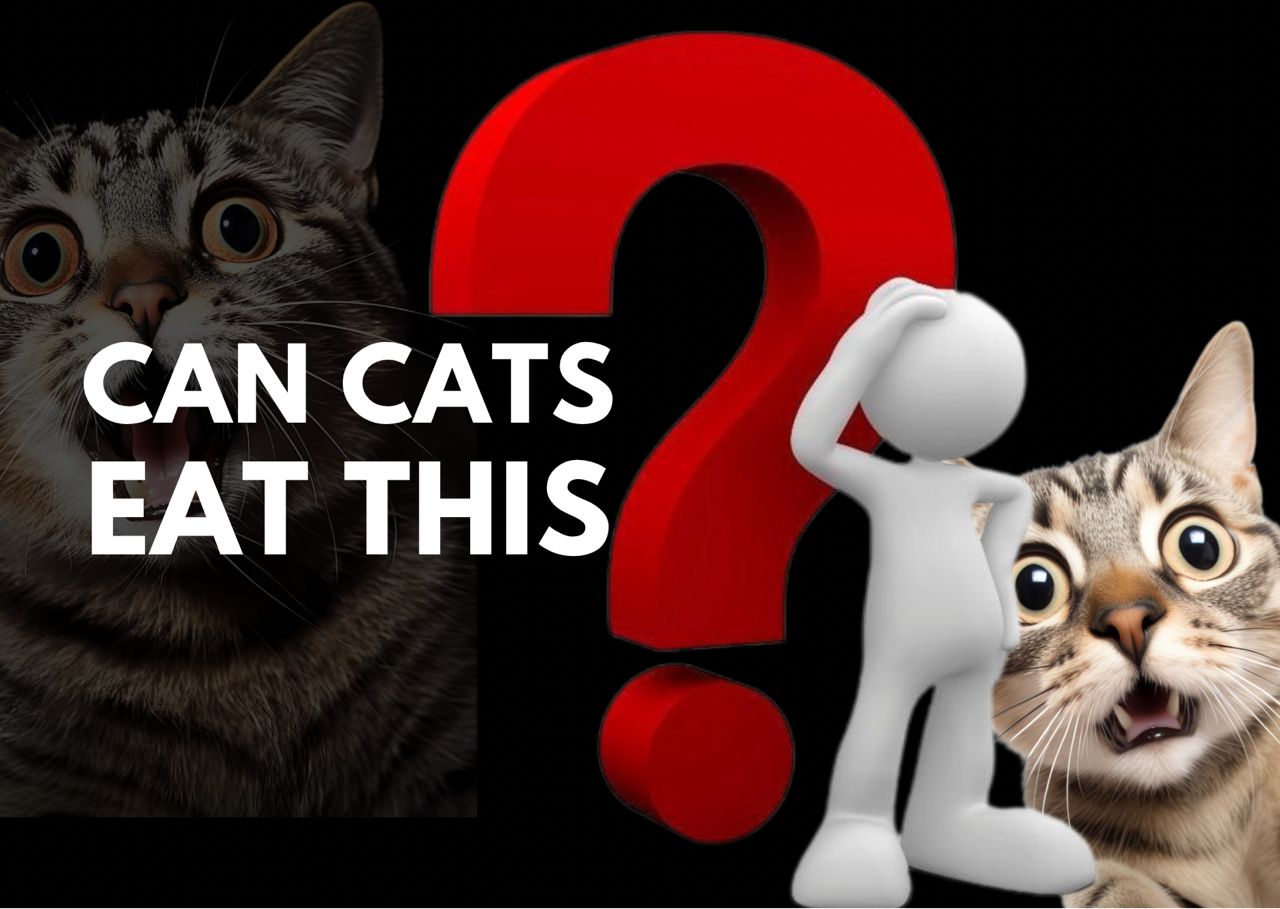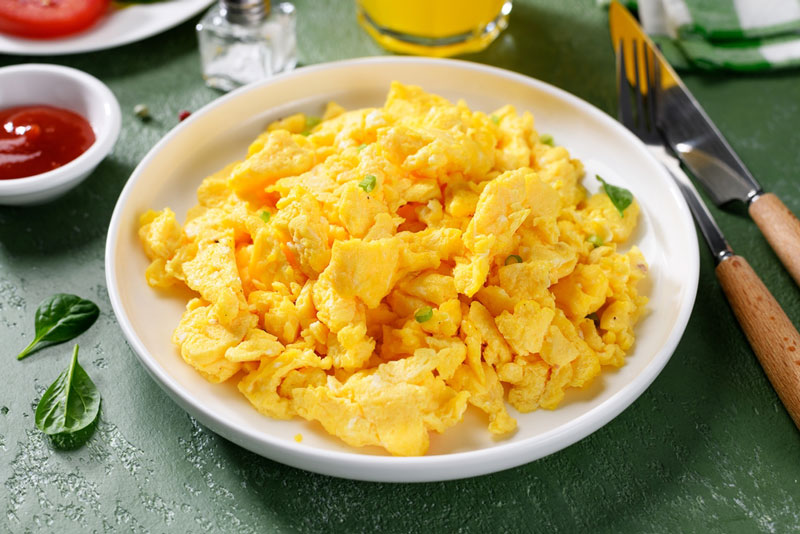Have you ever wondered if your fluffy feline can join you for breakfast and enjoy a delicious plate of scrambled eggs? Well, you’re in luck! Cats can indeed eat scrambled eggs, and they often find them quite tasty! Just like us, our beloved cats can appreciate the yummy flavor and creamy texture of this popular breakfast dish.
It’s important to remember that while eggs can be a delightful treat for our furry friends, there are some guidelines we should follow. Cats are obligate carnivores, meaning they primarily require meat in their diet. Scrambled eggs can be a fantastic source of protein and other nutrients for our kitties when given in moderation!
If you’re curious to learn more about the benefits, risks, and how to safely offer scrambled eggs to your feline friend, stick around. We’ve got a lot of exciting information to share about our beloved pets and their dining adventures. So let’s dig in!
You might also be interested in: Can Cats Eat Quail Eggs?
Can Cats Eat Scrambled Eggs?

Absolutely! Cats can eat scrambled eggs, and many of them actually love the taste. Scrambled eggs provide a great source of protein, which is essential for our kitties. Just like we enjoy a good breakfast, our cats can enjoy scrambled eggs too!
However, there are a few things to keep in mind to ensure that feeding your cat scrambled eggs is both enjoyable and safe. For starters, always opt for plain scrambled eggs without any seasoning, oil, or butter. You wouldn’t want to give your cat any added ingredients that could upset their tummy or be unhealthy for them.
When cooking scrambled eggs for your feline, it’s best to cook them thoroughly. Raw eggs can carry bacteria like Salmonella, which can harm both humans and pets. So, make sure those eggs are cooked all the way through!
Serving size is another important aspect to consider. While cats may enjoy the taste of scrambled eggs, they are not a substitute for their regular cat food. Treats, including scrambled eggs, should only make up about 10% of your cat’s daily caloric intake. A little bit of egg as an occasional treat is perfect, but too much could lead to tummy troubles or an unbalanced diet.
If you notice that your cat has any adverse reactions after eating scrambled eggs, such as vomiting or diarrhea, stop feeding them immediately and consult your veterinarian. Most cats, however, will happily enjoy this yummy treat!
How Much Scrambled Eggs Can Cats Eat?
Determining how much scrambled egg to feed our feline friends is quite important! While it might be tempting to share your entire plate with your kitty, moderation is key. A small amount will do just fine.
As mentioned before, treats should only make up about 10% of a cat’s daily caloric intake. For a standard-sized cat, a few bites or a tablespoon of scrambled eggs once or twice a week is more than enough. If your cat loves their eggs, they will be excited for this rare and special treat!
When first introducing scrambled eggs to your cat’s diet, it’s best to start with a very small amount. Observe how your furry companion reacts to the new food. If they seem to enjoy it and there are no adverse effects, you can gradually increase the portion, but remember, we want to keep it small and occasional!
In general, please remember that our kitties have very different nutritional needs compared to humans. They need a diet rich in high-quality protein, and a small amount of scrambled eggs should not replace their balanced cat food. Think of it as a rare delicacy, like a little slice of heaven that we treat our furry friends with now and then!
If you’re unsure about how much to feed your cat, consulting with your veterinarian might be a great idea! They can give you specific recommendations tailored to your cat’s unique dietary needs.
Benefits Of Scrambled Eggs To Cats
1. A Great Source of Protein: Scrambled eggs are packed with protein, which is essential for muscle growth and repair. Cats rely on protein to maintain their energy levels, especially active and playful ones! Feeding your kitty some eggs can help provide them with the strength they need to pounce and play.
2. Healthy Fats: Eggs also contain healthy fats, which are important for your cat’s overall health. These fats can contribute to a shiny coat and healthy skin. We all want our cats to look their best, and adding a little bit of egg can help with that! Just remember to keep portions in check to avoid any weight gain.
3. Rich in Vitamins and Minerals: Scrambled eggs are not just protein; they also contain vitamins such as B12 and riboflavin, along with minerals like iron, selenium, and phosphorus. These nutrients help support your cat’s immune system and overall health. Ensuring our cats get a range of vitamins and minerals is crucial to keeping them happy and healthy!
4. Low Calorie: If you’re concerned about your cat’s weight or if they are prone to obesity, scrambled eggs can be a low-calorie treat when given in moderation. Eggs can help keep our kitty’s weight in check while still providing a tasty treat! Just make sure to balance it with their regular diet.
5. Variety in Their Diet: Adding scrambled eggs to your cat’s diet can provide a fun change in routine. Our furry companions can get bored with their regular meals, and introducing a new treat can make mealtime more exciting for them! It’s great to spice things up and keep their taste buds tingling!
Dangers Of Feeding Scrambled Eggs To Cats
While scrambled eggs can offer some benefits for our cats, it’s essential to be aware of the potential risks and dangers involved in feeding eggs to our furry companions. Being informed means we can keep our kitties safe and sound!
One of the main risks associated with feeding scrambled eggs is the chance of food allergies. Just like humans can develop allergies, same goes for cats! Some cats may be sensitive or allergic to eggs, resulting in digestive issues or skin irritations. Always start with a small amount of scrambled eggs and watch for any signs of allergies.
Another consideration is that feeding too many scrambled eggs may lead to poor nutrition. Remember that cats have specific dietary needs, and eggs should never replace their balanced cat food. Overindulgence could lead to an unbalanced diet or weight gain, so portion control is crucial!
It’s important to avoid adding any seasoning or oils when preparing scrambled eggs. Ingredients like salt or butter can be harmful to cats. Salt can lead to sodium ion poisoning, which has serious consequences for our furry friends. Always keep their food simple and safe!
Lastly, cats can suffer from a condition called pancreatitis, which can be triggered by high-fat foods. Although eggs have healthy fats, feeding too many can push it over the edge. If your cat has a history of pancreatitis, consult a veterinarian before offering scrambled eggs.
Substitute Of Scrambled Eggs For Cats
1. Cooked Chicken: If your kitty enjoys protein-packed meals, cooked chicken can be a great substitute for scrambled eggs. Just like eggs, chicken is high in protein and provides essential nutrients for our furry friends. Make sure to remove any bones or skin before serving to avoid any choking hazards!
2. Tuna: Tuna is another favorite amongst cats and can be used as a tasty substitute. Offer some canned tuna packed in water, not oil. Just make sure to offer it in moderation, as too much tuna can lead to mercury poisoning over time. It’s a delightful treat for our feline companions every now and then!
3. Cooked Fish: Fish, such as salmon or cod, can be another protein-rich option for your cat. Many cats enjoy fish flavors, and it’s loaded with essential omegas for their coat and skin health. Just ensure the fish is cooked, deboned, and served plain!
4. Tofu: For those looking for plant-based options, tofu can be a good source of protein. While not every cat will love it, it can be a healthy substitute for scrambled eggs when prepared carefully. Make sure it’s plain and cooked without added flavors!
5. Fresh Cat Food: If you’re uncertain about cooking or preparing treats for your kitty, consider investing in high-quality fresh cat food. This can provide total nutritional balance while offering delicious meals for your furry friend without the hassle of cooking!
Can Cats Eat Scrambled Eggs? Frequently Asked Questions
Is It Safe To Feed My Cat Scrambled Eggs Every Day?
Feeding your cat scrambled eggs every day isn’t recommended. Treats should only make up about 10% of your cat’s overall diet. Eggs can be given as an occasional treat to introduce variety in their meal plan!
Can Kittens Eat Scrambled Eggs?
Although kittens are generally in need of high-protein diets, it’s essential to check with a veterinarian before introducing scrambled eggs. Kittens have unique nutritional needs, and it’s important for their diet to be balanced.
What If My Cat Doesn’t Like Scrambled Eggs?
If your cat isn’t interested in scrambled eggs, don’t worry! Every cat has their own preferences. There are plenty of other delicious treats to explore and provide for them!
Can I Add Cheese To Scrambled Eggs For My Cat?
While some cats might enjoy cheese, many are lactose intolerant and can have digestive issues afterward. Avoid adding cheese to scrambled eggs to keep your feline happy and healthy!
How Should I Serve Scrambled Eggs To My Cat?
You should serve scrambled eggs plain and well-cooked. No added seasonings or oils! You can cut them into small bite-sized pieces for easy munching!
Final Thoughts
In summary, scrambled eggs can be a delightful treat for our feline friends! They provide protein, healthy fats, and other essential nutrients. However, we must always remember to serve them in moderation and prepare them safely without any added ingredients. Making sure to keep our kitty’s diet balanced and healthy ensures that they lead a happy life.
If you’re looking for more fun topics about pet care and nutrition, check out our blog! There are plenty of articles to explore. Whether you’re wondering if cats can eat cheese or yogurt, we have you covered!


